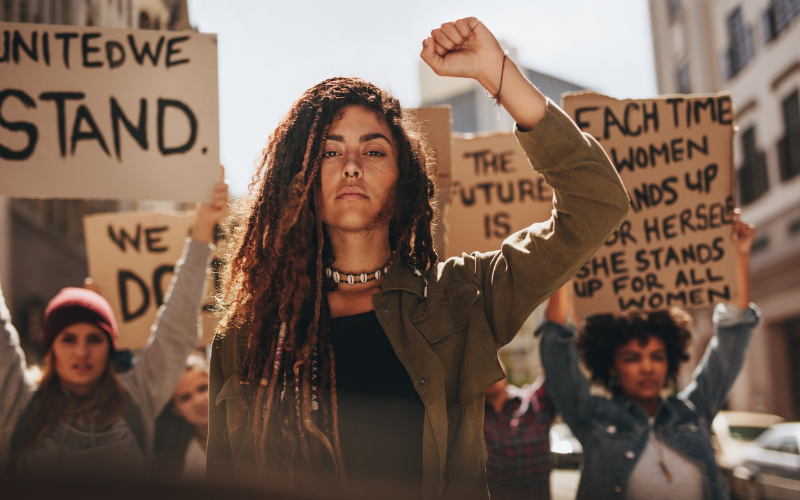As we observe International Women’s Day, 8 March 2023, and CSW67 (Commission on the Status of Women, Session 67) is taking place, with UN Women continuing to run local programs worldwide, one crucial question remains: What women? To whom is the UN talking?
The UN’s theme for 2023 is “DigitALL: Innovation and technology for gender equality,” which aims to recognize and celebrate the contribution women and girls make to technology and online education. The CSW67, taking place in New York on March 6-17, will also explore the impact of the digital gender gap on inequality for women and girls, as the UN estimates that women’s lack of access to the online world will cause a $1.5 trillion loss to the gross domestic product of low and middle-income countries by 2025 if action is not taken. Representatives of Member States, UN entities, and ECOSOC-accredited non-governmental organizations (NGOs) from all regions of the world are invited to contribute to the session.
However, where do we stand?
Writing these critical lines, I find it necessary to address my background as a Global South woman who only got to know the United Nations later in my adult life. At least in Brazil (where I am based), the UN activities are not promoted among civil society actors; instead, the women heading those activities are in a different socioeconomic position than most of us. What does this particular information say about the Organization’s influence in my home country? Lack of participation. Unfortunately, this scenario is not a Brazilian exclusivity.
In the Global South, where women face socioeconomic challenges, bias, violence, and inequality, civil society participation, needs to be about finding solutions and opening up opportunities. In other words, through active participation, we create space for listening and belonging, increasing opportunities for representation and promotion of gender equity.
In the past year, women in many countries, such as Afghanistan, Iran, and Ukraine, have been fighting for their rights amid war, violence, and political upheaval in their respective countries. In Afghanistan, the resurgence of the Taliban has hindered advancements in human rights, with women and girls now banned from higher education, from most jobs that would involve working outside of their homes, from traveling long distances without a male chaperone, and they are instructed to cover their faces in public.
In Iran, protests were sparked by the death of Mahsa Amini, a 22-year-old woman arrested by morality police in Tehran on 13 September 2022 for allegedly violating Iran’s strict rules requiring women to cover their hair with a scarf. Since then, demonstrations have continued across the country, with many female and male Iranians calling for better rights for women and a change in the current political leadership.
Following the invasion of Ukraine by Russian forces on 24 February 2022, the UN reported that gender gaps in food insecurity, malnutrition, poverty, and increased gender-based violence have worsened inside and around the world due to war-induced price hikes and shortages.
According to a survey called “The victimization of women in Brazil,” 1 in 4 Brazilian women over 16 (24.4%), or about 17 million women, said they had suffered violence during the Covid-19 pandemic, specifically in the past 12 months. Also, 5 out of 10 Brazilians (51.1%) pointed to having witnessed some form of violence against women in their neighborhood or community during the past year.
A key point is whether these women, victims of the patriarchal society, are being included or are they represented by women whose voices are also relevant but not part of the same background. What would social representation, in fact, mean in this context?
From the bottom to the top
Note that the diversity in Latin America and the Caribbean, for example, means a diversity of cultural and political perspectives and scenarios as well. Therefore, when we talk about the women of the Global South, we are referring to a variety of voices to be amplified in this geographical constellation. As inclusion means a long-term process, it is necessary to contemplate a strategy prioritizing a movement from the bottom to the top, which means including the perspectives of the women amongst the various vulnerable groups such as poor black women, disabled, indigenous, and others – to the one’s privileged in better socioeconomic aspects.
How we communicate to and with these women and their representation is the key to promoting gender equality programs. Through an inclusive and humanitarian communication strategy, we have a powerful tool to oversee participation in the most remote places. Therefore, creating space for education and qualification for the women we want to involve in decision-making is essential by teaching English as a standard language, the premises of feminism and social activism, gender rights and equality, and good governance. These are just some examples of an educational movement toward promoting inclusion.
Nevertheless, it is necessary and essential to connect voice, listening, and belonging (Marjoribanks, 2018). This process starts with the amplification of these individuals’ voices. Meanwhile, listening depends on integrating a large group of institutions, civil society movements, and social, economic, political, and cultural realities. The process of belonging begins when the voice and the listening aspects are ensured. It is from the sense of belonging of these women who have had their voices amplified and heard in a society that has been sensitized to this listening that the construction of a politics of belonging begins.
A cross-cultural and transnational analysis should contribute to integrating individuals, ideas, projects, institutions, and stakeholders from the public and private sectors and reducing systematic bias and discursive privileges emerging from places with more significant resources.
We – women from the Global South – are the everyday women, the daily struggling ones, the voices echoing, the calls for help, and the ones willing to act for the UN we need and the spaces we rightfully own.



